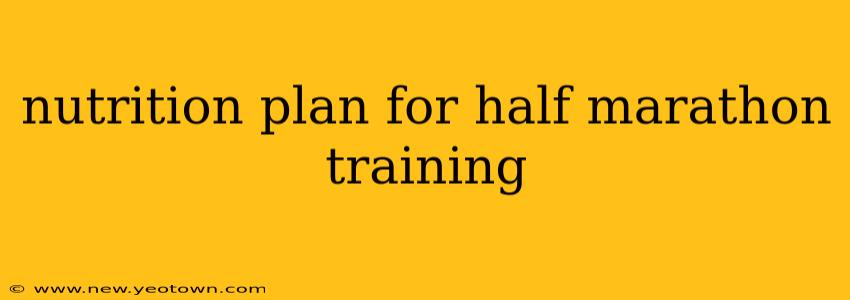Fueling Your Miles: A Nutrition Plan for Half Marathon Training
The thrill of crossing that half-marathon finish line is exhilarating, but reaching that point requires diligent training and, equally important, a well-structured nutrition plan. It's not just about running; it's about fueling your body to perform at its best, prevent injuries, and ensure consistent progress. This isn't a one-size-fits-all approach; individual needs vary based on factors like age, metabolism, and training intensity. However, this guide provides a solid foundation to build upon.
Imagine your body as a high-performance machine. To run a half marathon, you need the right fuel—clean, efficient energy sources that keep you going strong throughout your training and on race day. Let's explore how to optimize your nutrition for peak performance.
What should I eat before a long run?
This is a crucial question, and the answer depends on the length and intensity of your run. For runs lasting longer than an hour, you need sustained energy. Aim for a meal containing complex carbohydrates, some protein, and a moderate amount of healthy fats, consumed 2-3 hours before your run. A good example might be oatmeal with berries and a sprinkle of nuts, or whole-wheat toast with avocado and a poached egg. Avoid high-fiber foods close to your run, as they can cause digestive upset.
How much protein should I eat when training for a half marathon?
Protein is essential for muscle repair and growth, crucial for recovering from intense training sessions. Aim for 1.2-1.6 grams of protein per kilogram of body weight. Good sources include lean meats, fish, poultry, beans, lentils, and Greek yogurt. Don't overload on protein; it's about balance. Too much protein can lead to digestive issues and may not be efficiently used by the body.
What are the best foods for runners?
The best foods for runners are those that provide sustained energy, facilitate recovery, and support overall health. This includes:
- Complex Carbohydrates: Whole grains (brown rice, quinoa, oats), sweet potatoes, whole-wheat pasta, fruits, and vegetables. These provide slow-releasing energy, preventing energy crashes.
- Lean Protein: Chicken breast, fish (salmon, tuna), beans, lentils, tofu. Essential for muscle repair and growth.
- Healthy Fats: Avocado, nuts, seeds, olive oil. Important for hormone production and overall health.
- Hydration: Water is paramount! Drink consistently throughout the day and especially before, during, and after your runs. Consider electrolyte drinks for longer runs.
What should I eat after a half marathon?
Post-race nutrition is crucial for recovery. Within 30-60 minutes of finishing, consume a meal or snack containing carbohydrates and protein to replenish glycogen stores and aid muscle repair. A good option might be a smoothie with protein powder, fruit, and yogurt, or a turkey sandwich on whole-wheat bread.
How can I prevent stomach problems during a half marathon?
Stomach problems are a common runner's woe. To prevent them:
- Practice your race-day nutrition during training. This helps your body adapt to the foods you'll be consuming.
- Avoid high-fiber foods close to your run.
- Stay hydrated. Dehydration can exacerbate digestive issues.
- Consider smaller, more frequent meals and snacks. This can be easier to digest than large meals.
- Experiment with different types of energy gels or chews. Find what works best for your body.
What are some sample meal plans for half marathon training?
Creating a sample meal plan requires considering your individual needs and training schedule. However, here’s a general framework:
- Breakfast: Oatmeal with berries and nuts, whole-wheat toast with avocado, scrambled eggs with vegetables.
- Lunch: Salad with grilled chicken or fish, lentil soup with whole-wheat bread, quinoa bowl with vegetables and chickpeas.
- Dinner: Baked salmon with roasted vegetables, chicken stir-fry with brown rice, turkey meatballs with whole-wheat pasta.
- Snacks: Fruits (banana, apple), yogurt, trail mix, energy bars (check ingredients!), vegetables with hummus.
Remember, consistency is key. This nutrition plan is a guide; adapt it to your individual needs and preferences. Consult with a registered dietitian or sports nutritionist for personalized advice. Your body will thank you for the effort, helping you reach your half-marathon goals and enjoy the journey.

